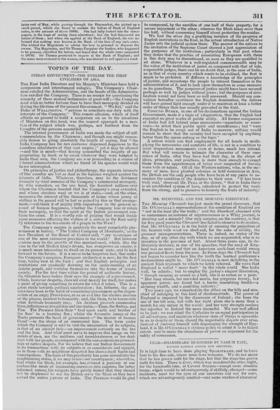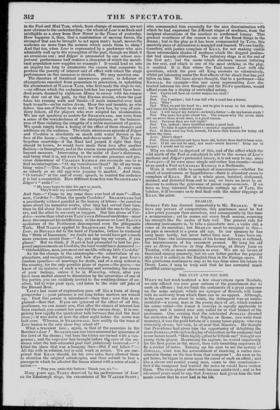LEAR — SHAKSPEARE MURDERED BY NAHUM TATE, COVENT GARDEN AIDING AND ABETTING.
IT is high time to have done playing SHAKSPEARE, and to leave hint to the fire-side, where none is so welcome. We do not mean that he has grown unfit for the stage, but that the stage has grown unfit for hint. There is Lear, which was murdered the other night, for the hundredth time, at Covent Garden—except some obsolete terms, which would be advantageously, if skilfully, changed—some incidents, meet for the eyes of our ancestors but not for ours, which are advantageously omitted—and some strokes of character in the Fool and Mad Tom, which, from change of manners, are not now obvious to the understanding—the whole of Lear is as fresh and intelligible as a story from Bow Street in the Times of yesterday. How happens it, then, that a combination of moving forces, the strongest that can be brought to act upon man's heart, moves the audience no more than the sermon which sends them to sleep? And that too, when Lear is represented by a performer who acts admirably well up to his conception of the part, though we think it • an erroneous one ; and Edgar is personated by one whose con- jectural performance half realizes a character of which the mendi- cant population now supplies no example ! It would lead us into an inquiry too long to enumerate the causes that cooperate to produce the poverty of interest and of effect with which the stage performance on this occasion is stricken, We may mention one. The directors of theatrical manoeuvres persist, in defiance of objurgations repeated from generation to generation, in upholding the abomination of NAHUM TATE, who first made the stage to sin; —an offence which the audacious botcher has repented these hun- dred years, doomed by righteous Minos to sweep with his tongue the dust out of the path, by that Elysian stream, where the poet takes his evening walk and thinks—if souls immortal ever look back to earth—on-his native Avon. Hear this and tremble, ye who follow this son of Nebat to do evil ; for TATE has, by way of aux- iliary lickers, all the players who ever adopted his abomination. We are not speaking as zealots for SHAKSPEARE, nor even from a sense of the wretchedness of the interpolations, or the heinous- ness of thus violating the integrity of a noble monument of genius. We speak simply from a feeling of the effect of these changes and additions on the audience. The whole interwoven episode of Edgar and Cordelia is absolutely so much cold water thrown in the face of the house ;—they sadden and shiver under it. This TATE- begotten courtship—if the Bard had judged it right that they should be lovers, he would have made them love after another fashion—is throughout, and in the rescue scene particularly, odious beyond measure. Intervening in the midst of Lear's distresses, and being what it is, not even the ever welcome presence and gra- cious demeanour of CHARLES KEMBLE can reconcile one to so foul an interruption—" 0, my tumultuous blood ! By all my trem- bling veins !"—This NAHUM 'S blood, we'll vouch it, ever went as soberly as an old egg-wile jogging to market. And then, " 0 torture at the end of every speech, to remind the audience it is but a counterfeit. How different from this was SHAKSPEAR.E'S Edglir'S " aside !"—
" My tears begin to take his part so much, They'll mar my counterfeiting."
And then—" Come to my arms thou ever best of men !"—How now, Cordelia ?—What, the gentle Cordelia! SHAKSPEARE had a peculiarity without parallel in the history of letters—he cared no more about his immortal works, after they had served their turn, than he did about his cast-off clothes,—he left the one to the play- ers, and the other to servants or beggars. But this abuse of Cor- delia—worse than what even TATE'S own Edmund meditates—must have discomposed his indifference, in like manner as Lord ELGIN'S spoliation of the Parthenon discomposed even the phlegmatic Turk. Had NAHUM applied to SHAKSPEARE for leave to alter Lear, as DRYDEN did to the bard of Paradise, before he traduced the " State of Innocence," we doubt not he would have got a much more gracious assent than—" Ay, you may tag my verses, if you please." But we think, if NAHUM had proceeded to hint his pro- posed improvements on Cordelia, the bard would have demurred :— " Odsboddikins, man, you must not meddle with my little Cordelia."
As for the change in the catastrophe—the substitution of ex-
planations, and recognitions, and how d'ye• does, for poor Lear s random speeches—of marriage for death, and of a snug retreat in the country, for the only possible place of repose—the grave,—we know of no instance of such a wresting and wrenching the course of your feelings, unless it be in Waverley, where, after you have been melted almost to dissolution by the adversities of one of the parties. you are suddenly invited to the wedding-dinner of an- other, bid to wipe your eyes, and listen to the stale old joke of the Blessed Bear.
TATE'S last scene of explanation goes off like a train of damp gunpowder ; —your patience is out long before matters are wound up. First this person is introduced—then that ; now this is ex- plained—then that. If you are ignorant of the effect of all this, gentlemen, we can assure you, that after the climax of interest has been reached, you cannot too soon bid the curtain drop. It is sur- prising how rapidly the quicksilver falls between this and the final close ;—it was down at zero the other night before the scene was half over. Whereas, in SHAKSPEARE, how swiftly do the woes of Lear hasten to the only close they admit of!
What a truculent farce, again, is that of the assassins in the
Botcher's Lear ! SHAKSPEARE has been censured for ignorance of the laws of the drama ; but here the tables are turned with a ven- geance; and the improver has brought before tiv. eyes of the au- dience what the halt-educated poet had judiciously removed.—" I killed the slave that was a-hanging thee—Did I not fellow ?"- All this tells in relation, but is cold work in action. We are sur- prised that KEAN should, for his own sake, have allowed them to abandon the original catastrophe, and thus submit to lose a passage in which he affected the house almost with a sense of suit', cation:— " Pray you, undo this button : Thank you, sir."— Many years ago, TERRY deserved by his performance of Lear on the Edinburgh stage, the encomiums of Sir WALTER SCOTT ; who commended him especially for the nice discrimination with which he had expressed the different stages of madness, from the incipient aberrations of the intellect to confirmed lunacy. This gradual overthrow of the reason is one of the finest things in the drama ; but in the play as it has been compounded by TATE, this masterly piece of delineation is mangled and marred. We can hardly, therefore, with justice complain of KEAN, for not making visible those intermediate shades of madness which the doggrel psalmo- dist had already obliterated. The initiatory stage is at the end of the first act ; but the scene which discloses reason tottering on her seat, and which is one of the most striking in the play, is omitted. It is that where the Fool teases Lear with idle questions, which the poor old King answers so submissively, whilst yet labouring under the first effects of the shock that has just fallen on him. We have always thought, that to a performer—like KEMBLE, for example—this one scene representing Lear dis- tracted between his own thoughts and the Fool's questions, would afford room for a display of unrivalled acting.
Fool. Can'st tell how an oyster makes his shell ?
Lear. No.
Fool. Nor I neither ; but I can tell why a snail has a house. Lear. Why ? Fool. Why, to put his head in ; not to give it away to his daughters, and leave his horns without a case.
Lear. I will forget my nature—so kind a father !—Be my horses ready Fool. Thy asses are gone about 'em. The reason why the seven stars are no more than seven stars, is a good reason.
Lear. Because they are not eight?
Fool. Yes, indeed; thou wouldest make a good fool. Lear. To take it again perforce !—monster ingratitude !
Fool. If thou wert my fool, nuncle, I'd have thee beaten for being old before thy time.
Lear. How's that ?
Fool. Thou shouldest not have been old, before thou had'st been wise. Lear. 0 let me not be mad, not mad—sweet heaven! Keep me in temper ; I would not be mad!
Why we should be deprived of this, and of the effect which the wild mirth of the Fool is calculated to acid to the scenes of Lear's madness and Edgar's pretended lunacy, it is not easy to say, since FAwcErr—if he were more simple and rather less caustic—would be as good a Fool as CHARLES KEMBLE is a Bedlamite.
Were it worth while to complain of inaccuracies—whether the result of carelessness or forgetfulness—there is abundant cause to complain of KEAN. But in a whole piece, botched, disfigured, maimed, and distorted from end to end, we have no heart, to en deavour to redress the grievance of minor improvements. If we have so long tolerated the wholesale cuttings up of TATE, the botcher, it ill becomes us to find fault with the minor clippings of KEAN, the actor.



















 Previous page
Previous page